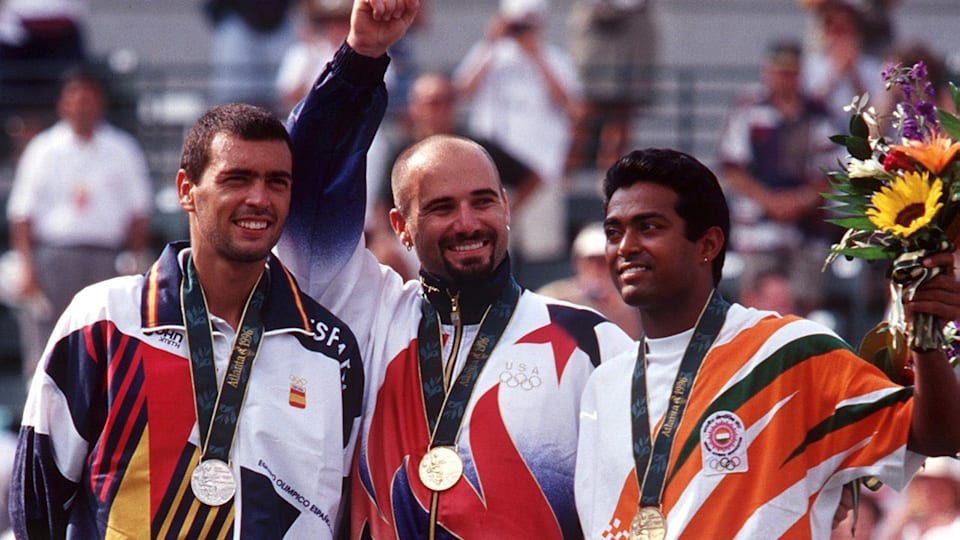From Pete Sampras to Andre Agassi: Leander Paes reflects on Atlanta 1996
The tennis legend ended a 44-year-long individual Olympic medal drought for India at the Atlanta Games.

When Leander Paes was about to make his appearance at the 1996 Olympics, he was only thinking about clearing the first hurdle; a medal didn't feature in the scheme of things just yet.
He had prepared arduously for Atlanta 1996, playing tennis at high altitudes in the preceding year to acclimatise himself to the conditions.
Come the Games, he would face another tall order in the first round.
“When I got to Atlanta, I drew Pete Sampras. He was probably the top seed at the time,” Leander Paes said on a show called The Medal of Glory on the Facebook page of Sony Sports.
“My teammates were like, ‘That’s a tough draw, Paes. Better luck at the next Olympics.’ No one really believed that I could beat Sampras,” he revealed.
Pete Sampras at the time was world no.1 and tipped to win the gold medal. However, after the tough draw, there was a change in fortunes that brought about some relief for Leander Paes.
“At 6pm the day before I was supposed to play him, Sampras pulled out of the Olympics (due to injury)... It was a sigh of relief that I didn’t have to play one of the best seeds,” Leander Paes admitted.
Instead of Pete Sampras, Richey Reneberg became the Indian tennis ace’s first opponent at the 1996 Olympics, with Leander Paes upstaging the American in three sets.
Duel with Andre Agassi
Leander Paes’ most memorable match at Atlanta 1996 though was his semi-final clash against Andre Agassi, with the contest still fresh in his 46-year-old Indian’s mind.
“Agassi was a genius of the game and his mental aptitude to handle situations really shone through in that semis,” Leander Paes reminisced.
“I had two set points in the first set and both of us knew that whoever won the set would be in the driver’s seat and control for the match.
“At 15-40, leading 5-6 in the first set, I remember closing him at the net after a backhand return to his serve. I had everything possible covered – the cross-court shot, the down the line pass, a drop or a dive volley, the backhand and forehand smash, I could cover the lobbed shots as well.
“But, despite having all of those areas covered, I didn’t cover my jaw and Andre targeted that spot. His backhand shot came right at my face. I wasn’t ready and by the time I reacted, I could only play a backhand volley.
Battling through injury for bronze
“The wrist was in a weak spot and I injured the tendons from my wrist to my elbow. I remember my racquet fell out of my hand as I missed the shot,” he elaborated.
The defeat in the semi-finals aside, Leander Paes now had to deal with an injury in the bronze medal match but fortunately for him, he had a full day to recover.
“I had to go and get my MRI done after I lost my semi-final match to Agassi. Before the bronze medal playoff match, I had to get a cast on my playing hand. But, luckily, I had a day off before my playoff against Fernando Meligeni,” he said.
Leander Paes went on to come back from a set down before beating Fernando Meligeni in the bronze medal match to bring home India’s first individual Olympic medal in 44 years.
Bragging rights remain with Vece Paes
Growing up it was always a dream for Leander Paes to win an Olympic medal.
The Indian tennis legend, now a seven-time Olympian, wanted to follow in the footsteps of his father Vece Paes, who was a part of the bronze medal-winning Indian hockey team at the 1972 Olympics.
And even if he remains as one of the few individual medallists from India, he will be always second to his father.
“Every Sunday I used to polish my father’s Olympic medal,” he recalled. “The Olympic medal is the happiest prize that I have.
“Dad will always have the bragging rights (of winning it first),” he pointed out.
After Leander Paes ended India’s medal drought at the Atlanta Games, India has since claimed at least one medal in each of the following Olympics.
